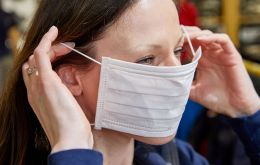MercoPress. South Atlantic News Agency
Health & Science
-
Saturday, June 13th 2020 - 08:46 UTC
Brazil overtakes UK and has the second highest coronavirus death toll

Brazil on Friday claimed the unenviable position of having the second-highest coronavirus death toll in the world behind the United States, where several states have posted record daily case totals, signaling the crisis is far from over.
-
Saturday, June 13th 2020 - 08:07 UTC
German health minister demands a more independent Europe for medical supplies

Europe needs to become more independent in supplying itself with face masks and certain medicines as it battles the coronavirus outbreak, German Health Minister Jens Spahn said on Friday.
-
Saturday, June 13th 2020 - 08:00 UTC
Zara plans to close 1,200 outlets and invest heavily in boosting online sales

Zara owner Inditex said it is permanently closing as many as 1,200 stores - 16% of its outlets worldwide - as the world's largest fashion retailer moves to boost online sales after posting its first-ever loss due to the Covid-19 pandemic.
-
Saturday, June 13th 2020 - 07:20 UTC
Chile's metropolitan region overwhelmed by the pandemic; half the country in strict confinement

Chile registered its worst daily figures for coronavirus fatalities on Friday, with 222 deaths and more than 6,700 new infections in the previous 24-hours, authorities said.
-
Saturday, June 13th 2020 - 07:09 UTC
North and South America have four of the 10 worst Covid-19 hit countries

The Americas are bearing the brunt of the global coronavirus pandemic at present, the World Health Organization (WHO) said on Friday, with North and South America currently having four of the 10 worst hit countries in the world.
-
Saturday, June 13th 2020 - 07:04 UTC
WHO argues Brazil's hospitals coping with the virus, despite record death toll

Brazil's COVID-19 death toll overtook Britain's on Friday to become the second-highest in the world with 41,828 dead, but the World Health Organization said the nation's health system was standing up to the pressure.
-
Saturday, June 13th 2020 - 07:01 UTC
British Airways labeled “a national disgrace” by UK lawmakers

British Airways (BA) was labeled a “national disgrace” by lawmakers for its treatment of employees on Saturday, adding to pressure on the airline as it juggles job cuts and new quarantine rules.
-
Friday, June 12th 2020 - 10:09 UTC
Brazil death toll climbs to 40,000 and could overtake Britain this Friday

Brazil has surpassed 40,000 deaths from the novel coronavirus and 800,000 cases, according to the latest figures from the health ministry on Thursday. The news came as the number of Latin American cases of the virus broke through the 1.5 million barrier.
-
Friday, June 12th 2020 - 09:59 UTC
Fallout from pandemic could plunge 395 million people into extreme poverty

The economic fallout from the coronavirus pandemic could plunge an extra 395 million people into extreme poverty and swell the total number of those living on less than US$1.90 a day worldwide to more than 1 billion, researchers said in a report on Friday.
-
Friday, June 12th 2020 - 09:51 UTC
Gibraltar residents able to cross the frontier into Spain

Gibraltar confirmed hat following direct contact between the Chief Minister and the Spanish Minister of the Interior, residents of Gibraltar and EU residents of Gibraltar are now able to cross the frontier into Spain.